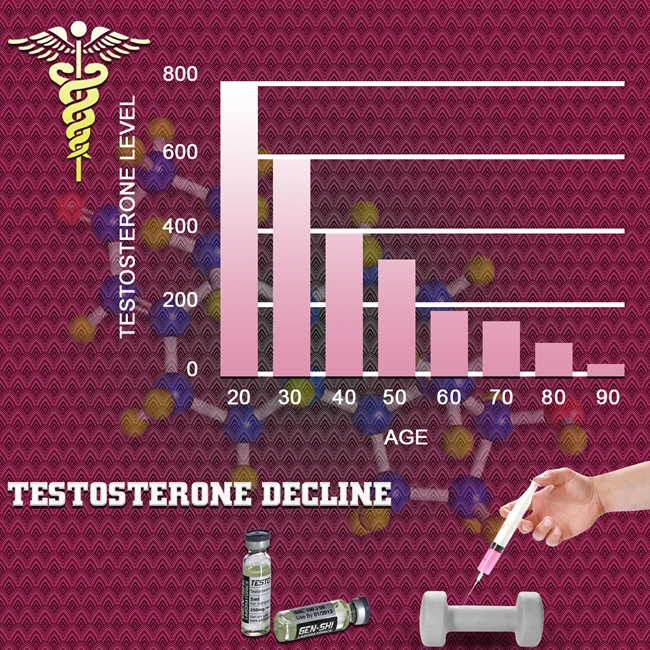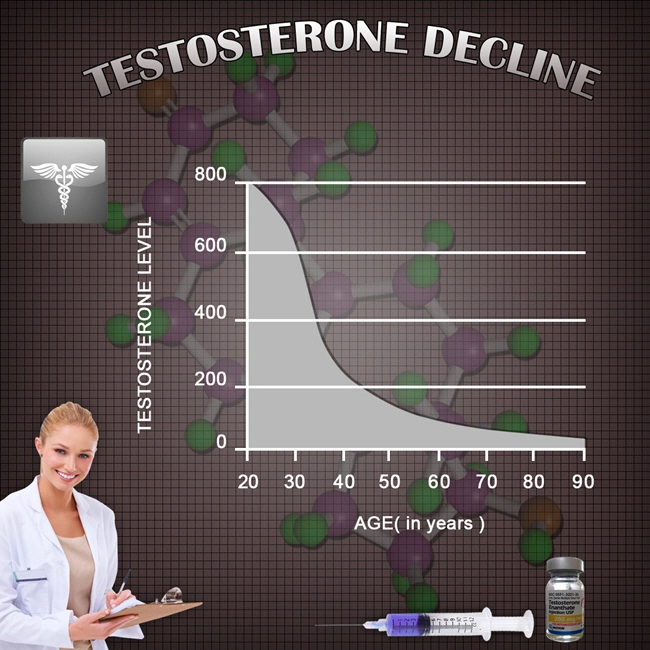
A new study reveals that Testosterone improves body composition in men with low testosterone!
The benefits of Testosterone Replacement Therapy (TRT) are numerous and well-known: Evaporating slabs of lard, especially around the midsection; increased strength and muscle mass: exploding surges of energy; better sleep; a long-dormant optimistic mood, better concentration, and the thrill of a roaring back to life libido!
Why does this happen? Why does the so-called “manly hormone” testosterone produce such dramatic benefits?
To answer those questions, a new study looked at the effects of testosterone on metabolism. It concluded that testosterone fine-tunes body composition, even in men with hypogonadism (low testosterone aka “Low-T”) levels.
The recent study was led by Dr. Reina Villareal, an endocrinologist at the Michael E. DeBakey VA Medical Center in Houston and a professor at the nearby Baylor College of Medicine. Along with Dr. Fnu Deepika and several researchers, the study's goal was to see if TRT could change body composition, metabolic profile, bone turnover markers, and bone mineral density (BMD). Bone mineral density is a critical metric in older people since it measures bone thickness, and bone turnover is the process of resorption followed by replacement by new bone with a minor change in shape.
metabolic profile, bone turnover markers, and bone mineral density (BMD). Bone mineral density is a critical metric in older people since it measures bone thickness, and bone turnover is the process of resorption followed by replacement by new bone with a minor change in shape.
To emphasize the significance of the study, Dr. Villareal stated that “This could mean that men in some ways could derive benefit from T therapy even if their T level is not as low as defined by the Endocrine Society,” whose guideline for Low-T is less than 264 nanograms per deciliter (ng/dL).
She added, “I am not advocating to treat anyone with normal T levels for those benefits because of the serious side effects associated with T therapy, such as an increase in cardiovascular issues, blood clots, and prostate enlargement. There is an ongoing randomized placebo-controlled study with over 5,000 men that is addressing the cardiovascular safety of T replacement therapy. That will likely confirm or dispute the safety concerns of T replacement therapy.”
Testosterone Replacement Therapy has been growing by leaps and bounds recently, and the controversy concerning its benefits and risks rages. Testosterone is a crucial male hormone responsible for the male libido, strengthening bones, manufacturing red blood cells, and muscle size and strength.
Around age 30, men begin to see their testosterone levels ebbing at approximately 10% per decade if the issue is not addressed. In addition to aging, a link has been established between Low-T, obesity, and type 2 diabetes have low T levels, according to the Endocrine Society.
TRT is not prescribed for obesity, but testosterone is a powerful tool in the battle against obesity due to the hormone’s ability to ramp up muscle mass and scorch body fat, leading to healthier body composition.
The idea for Villareal’s study was the conclusion from another study that testosterone levels influence (BMD) response to TRT in men with Low-T. That study found that a baseline testosterone level of less than 200 ng/dL is related to more significant increases in spine BMD. A BMD test helps clinicians uncover osteoporosis and predict the risk for bone fractures.
Villareal and her colleagues embarked on a mission to see if body composition and metabolic response vary according to baseline testosterone levels. Studies have shown that these outcomes could be uplifted with TRT, but it’s uncertain if the response would change according to testosterone levels.
The results were unexpected.
The study consisted of 105 male Veterans, ages 40 to 74, with Low-T. It covered five years from 2011 to 2016 at the Michael E. DeBakey VA and the New Mexico VA Health Care System. The authors called it the initial study to determine if the effects of TRT on body composition, metabolic profile, and bone turnover markers are regulated by testosterone levels.
The researchers examined the effects of TRT on men with Low-T, defined as lower than 300 ng/dL, by the Endocrine Society’s guideline until 2018. That year, its guideline was lowered to less than 264 ng/dL. This change is meaningful since the study was conducted and concluded before that change. Therefore, some participants would have normal testosterone levels based on the new criteria.
The TRT regimen consisted of injecting 200 milligrams every two weeks of testosterone cypionate (trade name Depo-Testosterone), an androgen and anabolic steroid used mainly to treat low T levels in men.
The dose was later adjusted to a blood level of 500 to 800 ng/dL, then 300 to 600 ng/dL after year three of the study, upon the recommendations of the FDA. Side effects from the drug were similar to previous reports.
Dr. Villareal and her team discovered that men benefited from TRT regardless of their baseline testosterone level. For example, men with levels less than 264 ng/dL showed a more significant increase at 18 months in total fat-free mass, mainly lean muscle mass, compared with those higher than 264 ng/dL.
Contrary to the study hypothesis, men with testosterone levels above 264 ng/dL appeared to enjoy more significant benefits from a metabolic standpoint, including a lowering of Hemoglobin A1c (HbA1c), a diabetes marker, along with a drop in blood glucose levels, which shoot up in people with diabetes and LDL (bad cholesterol).
A leptin drop, the so-called “satiety hormone,” which lowers appetite, was attributed mostly to a loss of fat mass, which produces leptin. But that should not be seen as an adverse effect of TRT, according to Villareal.
 “We found that surprising,” she says. “Our original hypothesis was that response in these parameters will be better for those with lower testosterone levels. That did not happen, suggesting that those with normal T by the current guidelines will benefit from the drug.”
“We found that surprising,” she says. “Our original hypothesis was that response in these parameters will be better for those with lower testosterone levels. That did not happen, suggesting that those with normal T by the current guidelines will benefit from the drug.”
However, the researchers urged caution concerning TRT. “Although prior studies have suggested improvement in insulin sensitivity in men with low T, a recommendation to give T to improve the metabolic profile remains controversial. Our findings support the partial metabolic benefit from T among men with levels of more than 264 ng/dL who, by current guidelines, will not be treated with T. Therefore, the information presented in the manuscript could be valuable for both clinicians and patients in shared decision-making.”
Concerning the effect testosterone has on obesity, Dr. Villreal said that “We surmise that the better response in fat-free mass in those with lower T levels could be due to greater sensitivity of the muscle to testosterone replacement than those with higher levels. However, one should not forget that those with higher levels had an increase in fat-free mass, as well, only to a lesser extent compared to those with lower T levels.
“On the other hand,” she continued, “the better metabolic response among those with higher T levels is hard to explain, except that maybe the group with less than 264 ng/dL needed more time on adequate T levels to see a significant improvement in blood sugar and other metabolic factors such as cholesterol. We are working on clarifying the reason for this finding in a lab” at the Michael E. DeBakey VA.
Dr. Villareal and her team hope for a VA-funded study to examine TRT's impact on men with diabetes and Low-T. The researchers are also measuring changes in bone structure and strength.
“We hope to reach a conclusion for our findings from this cohort down the road,” she says. She and her team are also interested in other results, noting that evidence has uncovered a link between bone metabolism and glucose metabolism, or diabetes control. “Hence, any change in bone metabolism brought about by T therapy may also be accompanied by changes in glucose metabolism,” she notes.
“Since we are also assessing all the metabolic parameters in this study, broadly, we would like to explore if changes in bone parameters associated with T therapy will correlate with changes in metabolic parameters. “We’ll know more as time goes on.”
The results appeared in Frontiers in Endocrinology in July 2022.
Contact us for a FREE, no-obligation discussion about the incredible benefits of Testosterone Replacement Therapy (TRT)!
Reference
Contact Us Today For A Free Consultation
Dear Patient,
Once you have completing the above contact form, for security purposes and confirmation, please confirm your information by calling us.
Please call now: 1-800-380-5339.
Welcoming You To Our Clinic, Professor Tom Henderson.

- LabCorp Announces a Change to the Testosterone Reference Range [Last Updated On: April 16th, 2025] [Originally Added On: June 23rd, 2019]
- Important Facts About Testosterone Therapy Before Buying [Last Updated On: April 18th, 2025] [Originally Added On: July 13th, 2019]
- Soy: Does it Lower Testosterone? [Last Updated On: October 18th, 2024] [Originally Added On: August 30th, 2020]
- Testosterone Treatments May Successfully Reverse Type-2 Diabetes in Some Men [Last Updated On: April 15th, 2025] [Originally Added On: November 13th, 2020]
- Testosterone Replacement Therapy (TRT) May Prevent Heart Attacks and Diabetes [Last Updated On: April 21st, 2025] [Originally Added On: November 17th, 2020]
- Did You Know? Recent Studies Have Confirmed the Link Between Low Testosterone (“Low-T”) and Depression. [Last Updated On: April 17th, 2025] [Originally Added On: January 10th, 2021]
- New Study Finds Testosterone Does Not Increase Your Heart Attack Risk [Last Updated On: April 14th, 2025] [Originally Added On: January 11th, 2021]
- The Great Testosterone Debate [Last Updated On: April 20th, 2025] [Originally Added On: January 14th, 2021]
- Testosterone Replacement Therapy Lowers Heart Attack Risk [Last Updated On: April 19th, 2025] [Originally Added On: January 18th, 2021]
- New Study Says: The Benefits of Testosterone Replacement Therapy Outweigh The Risks [Last Updated On: April 22nd, 2025] [Originally Added On: January 19th, 2021]
- Male Menopause. Fact or Fiction ? [Last Updated On: April 23rd, 2025] [Originally Added On: January 20th, 2021]
- Testosterone: How Much Do You Really Know About This Masculine Hormone? [Last Updated On: October 6th, 2024] [Originally Added On: February 9th, 2021]
- Low-T: What are healthy levels of Testosterone and why is it difficult to measure? [Last Updated On: September 11th, 2025] [Originally Added On: April 3rd, 2021]
- Testosterone Therapy May Be Good for the Heart if You Have Low-T [Last Updated On: May 3rd, 2025] [Originally Added On: July 21st, 2021]
- A Recent Study Concludes: Testosterone DOES NOT Cause Prostate Cancer [Last Updated On: September 14th, 2025] [Originally Added On: August 16th, 2021]
- In the Battle Against Aging, When do the Risks Outweigh the Rewards? [Last Updated On: April 4th, 2025] [Originally Added On: August 18th, 2021]
- New Study Concludes: Boosting Testosterone Levels Lowers Men's Death Risk [Last Updated On: May 11th, 2025] [Originally Added On: August 20th, 2021]
- Testosterone Replacement Therapy Slows Prostate Cancer! [Last Updated On: April 2nd, 2025] [Originally Added On: September 13th, 2021]
- Research proves that Testosterone Therapy Boosts Fertility! [Last Updated On: April 5th, 2025] [Originally Added On: September 26th, 2021]
- Free Testosterone and Sex Hormone-Binding Globulin [Last Updated On: April 6th, 2025] [Originally Added On: October 15th, 2021]
- Testosterone Does Not Cause Heart Attacks [Last Updated On: April 7th, 2025] [Originally Added On: October 15th, 2021]
- Testosterone and Women [Last Updated On: April 8th, 2025] [Originally Added On: October 15th, 2021]
- Testosterone and Metabolic Syndrome [Last Updated On: April 3rd, 2025] [Originally Added On: October 15th, 2021]
- Testosterone and Disease Prevention [Last Updated On: March 31st, 2025] [Originally Added On: October 15th, 2021]
- Judge Vacates $140 Million Verdict in Testosterone Lawsuit [Last Updated On: April 1st, 2025] [Originally Added On: October 15th, 2021]
- Testosterone and Estrogen [Last Updated On: April 9th, 2025] [Originally Added On: October 16th, 2021]
- Testosterone and Aging [Last Updated On: April 10th, 2025] [Originally Added On: October 16th, 2021]
- Testosterone Replacement Therapy (TRT) Benefits [Last Updated On: April 11th, 2025] [Originally Added On: October 16th, 2021]
- Testosterone and Male Menopause [Last Updated On: March 30th, 2025] [Originally Added On: October 16th, 2021]
- Testosterone Battles Obesity [Last Updated On: March 29th, 2025] [Originally Added On: October 16th, 2021]
- Why You Need Testosterone Replacement Therapy [Last Updated On: May 14th, 2025] [Originally Added On: October 16th, 2021]
- Testosterone FAQ's [Last Updated On: May 13th, 2025] [Originally Added On: October 25th, 2021]
- How Testosterone Impacts Sexual Preferences In Men and Women [Last Updated On: March 28th, 2025] [Originally Added On: October 30th, 2021]
- Growth Hormone and The Thyroid Gland [Last Updated On: April 24th, 2025] [Originally Added On: November 19th, 2021]
- How Does Masturbation Affect Testosterone Levels? Exploring the Science [Last Updated On: May 24th, 2025] [Originally Added On: March 27th, 2022]
- Testosterone Therapy Increasingly Used to Help Men Take Control of Aging [Last Updated On: May 25th, 2025] [Originally Added On: May 30th, 2022]
- The many benefits of Testosterone Replacement Therapy (TRT) [Last Updated On: November 1st, 2025] [Originally Added On: June 13th, 2022]
- Tlando Testosterone - A Brand New Way to Treat Low-T Safely with a Testosterone Pill [Last Updated On: May 28th, 2025] [Originally Added On: July 12th, 2022]
- Safe Tlando Testosterone Changes Landscape of Low-T Therapy [Last Updated On: May 30th, 2025] [Originally Added On: August 15th, 2022]
- Systems to Monitor Testosterone Replacement Therapy (TRT) [Last Updated On: October 12th, 2025] [Originally Added On: September 21st, 2022]
- Testosterone May Help You Keep Your Job (Or Find Another) [Last Updated On: June 12th, 2025] [Originally Added On: October 4th, 2022]
- Toxic Chemicals are Killing your testosterone…And your Manhood! [Last Updated On: October 28th, 2024] [Originally Added On: October 10th, 2022]
- A former Mr. Olympia speaks about testosterone [Last Updated On: October 10th, 2025] [Originally Added On: November 8th, 2022]
- Testosterone Blockers Thwart Melanoma [Last Updated On: June 9th, 2025] [Originally Added On: December 11th, 2022]








